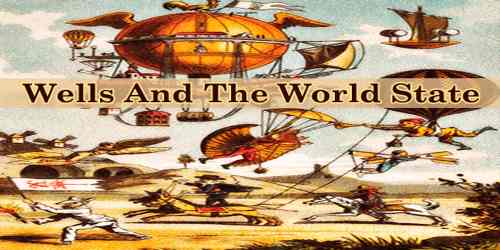There was recently a highly distinguished gathering to celebrate the past, present, and especially future triumphs of aviation. Some of the most brilliant men of the age, such as Mr. H. G. Wells and Mr. J. L. Garvin, made interesting and important speeches, and many scientific aviators luminously discussed the new science. Among their graceful felicitations and grave and quiet analyses a word was said, or a note was struck, which I myself can never hear, even in the most harmless after-dinner speech, without an impulse to leap up and yell, and smash the decanters and wreck the dinner-table.
Long ago, when I was a boy, I heard it with fury; and never since have I been able to understand any free man hearing it without fury. I heard it when Bloch, and the old prophets of pacifism by panic, preached that war would become too horrible for patriots to endure. It sounded to me like saying that an instrument of torture was being prepared by my dentist, that would finally cure me of loving my dog. And I felt it again when all these wise and well-meaning persons began to talk about the inevitable effect of aviation in bridging the Atlantic, and establishing alliance and affection between England and America.
I resent the suggestion that a machine can make me bad. But I resent quite equally the suggestion that a machine can make me good. It might be the unfortunate fact that a coolness had arisen between myself and Mr. Fitzarlington Blenkinsop, inhabiting the suburban villa and garden next to mine; and I might even be largely to blame for it. But if somebody told me that a new kind of lawn-mower had just been invented, of so cunning a structure that I should be forced to become a bosom-friend of Mr. Blenkinsop whether I liked it or not, I should be very much annoyed. I should be moved to say that if that was the only way of cutting my grass I would not cut my grass, but continue to cut my neighbor. Or suppose the difference were even less defensible; suppose a man had suffered from a trifling shindy with his wife. And suppose somebody told him that the introduction of an entirely new vacuum-cleaner would compel him to a reluctant reconciliation with his wife. It would be found, I fancy, that human nature abhors that vacuum. Reasonably spirited human beings will not be ordered about by bicycles and sewing-machines; and a sane man will not be made good, let alone bad, by the things he has himself made. I have occasionally dictated to a typewriter, but I will not be dictated to by a typewriter, even of the newest and most complicated mechanism; nor have I ever met a typewriter, however complex, that attempted such a tyranny.
Yet this and nothing else is what is implied in all such talk of the aeroplane annihilating distinctions as well as distances; and an international aviation abolishing nationalities. This and nothing else was really implied in one speaker’s prediction that such aviation will almost necessitate an Anglo-American friendship. Incidentally, I may remark, it is not a true suggestion even in the practical and materialistic sense; and the speaker’s phrase refuted the speaker’s argument. He said that international relations must be more friendly when men can get from England to America in a day. Well, men can already get from England to Germany in a day; and the result was a mutual invitation of which the formalities lasted for five years. Men could get from the coast of England to the coast of France very quickly, through nearly all the ages during which those two coasts were bristling with arms against each other. They could get there very quickly when Nelson went down by that Burford Inn to embark for Trafalgar; they could get there very quickly when Napoleon sat in his tent in that camp at Boulogne that filled England with alarums of invasion. Are these the amiable and pacific relations which will unite England and America, when Englishmen can get to America in a day? The shortening of the distance seems quite as likely, so far as that argument goes, to facilitate that endless guerilla warfare which raged across the narrow seas in the Middle Ages; when French invaders carried away the bells of Rye, and the men of those flats of East Sussex gloriously pursued and recovered them. I do not know whether American privateers, landing at Liverpool, would carry away a few of the more elegant factory chimneys as a substitute for the superstitious symbols of the past. I know not if the English, on ripe reflection, would essay with any enthusiasm to get them back. But anyhow it is anything but self-evident that people cannot fight each other because they are near to each other; and if it were true, there would never have been any such thing as border warfare in the world. As a fact, border warfare has often been the one sort of warfare which it was most difficult to bring under control. And our own traditional position in face of this new logic is somewhat disconcerting. We have always supposed ourselves safer because we were insular and therefore isolated. We have been congratulating ourselves for centuries on having enjoyed peace because we were cut off from our neighbors. And now they are telling us that we shall only enjoy peace when we are joined up with our neighbors. We have pitied the poor nations with frontiers, because a frontier only produces fighting; and now we are trusting to a frontier as the only thing that will produce friendship. But, as a matter of fact, and for a far deeper and more spiritual reason, a frontier will not produce friendship. Only friendliness produces friendship. And we must look far deeper into the soul of man for the thing that produces friendliness.
But apart from this fallacy about the facts, I feel, as I say, a strong abstract anger against the idea, or what some would call the ideal. If it were true that men could be taught and tamed by machines, even if they were taught wisdom or tamed to amiability, I should think it the most tragic truth in the world. A man so improved would be, in an exceedingly ugly sense, losing his soul to save it. But in truth he cannot be so completely coerced into good; and in so far as he is incompletely coerced, he is quite as likely to be coerced into evil. Of the financial characters who figure as philanthropists and philosophers in such cases, it is strictly true to say that their good is evil. The light in their bodies is darkness, and the highest objects of such men are the lowest objects of ordinary men. Their peace is mere safety, their friendship is mere trade; their international friendship is mere international trade. The best we can say of that school of capitalism is that it will be unsuccessful. It has every other vice, but it is not practical. It has at least the impossibility of idealism; and so far as remoteness can carry it, that Inferno is indeed a Utopia. All the visible manifestations of these men are materialistic; but at least their visions will not materialize. The worst we suffer; but the best we shall at any rate escape. We may continue to endure the realities of cosmopolitan capitalism; but we shall be spared its ideals.
But I am not primarily interested in the plutocrats whose vision takes so vulgar a form. I am interested in the same thing when it takes a far more subtle form, in men of genius and genuine social enthusiasm like Mr. H. G. Wells. It would be very unfair to a man like Mr. Wells to suggest that in his vision the Englishman and the American are to embrace only in the sense of clinging to each other in terror. He is a man who understands what friendship is, and who knows how to enjoy the motley humours of humanity. But the political reconstruction which he proposes is too much determined by this old nightmare of necessitarianism. He tells us that our national dignities and differences must be melted into the huge mould of a World State, or else (and I think these are almost his own words) we shall be destroyed by the instruments and machinery we have ourselves made. In effect, men must abandon patriotism or they will be murdered by science. After this, surely no one can accuse Mr. Wells of an undue tenderness for scientific over other types of training. Greek may be a good thing or no; but nobody says that if Greek scholarship is carried past a certain point, everybody will be torn in pieces like Orpheus, or burned up like Semele, or poisoned like Socrates. Philosophy, theology and logic may or may not be idle academic studies; but nobody supposes that the study of philosophy, or even of theology, ultimately forces its students to manufacture racks and thumb-screws against their will; or that even logicians need be so alarmingly logical as all that. Science seems to be the only branch of study in which people have to be waved back from perfection as from a pestilence. But my business is not with the scientific dangers which alarm Mr. Wells, but with the remedy he proposes for them; or rather with the relation of that remedy to the foundation and the future of America. Now it is not too much to say that Mr. Wells finds his model in America. The World State is to be the United States of the World. He answers almost all objections to the practicability of such a peace among states, by pointing out that the American States have such a peace, and by adding, truly enough, that another turn of history might easily have seen them broken up by war. The pattern of the World State is to be found in the New World.
Oddly enough, as it seems to me, he proposes almost cosmic conquests for the American Constitution, while leaving out the most successful thing in that Constitution. The point appeared in answer to a question which many, like myself, must have put in this matter; the question of despotism and democracy. I cannot understand any democrat not seeing the danger of so distant and indirect a system of government. It is hard enough anywhere to get representatives to represent. It is hard enough to get a little town council to fulfil the wishes of a little town, even when the townsmen meet the town councilors every day in the street, and could kick them down the street if they liked. What the same town councillors would be like if they were ruling all their fellow-creatures from the North Pole or the New Jerusalem, is a vision of Oriental despotism beyond the towering fancies of Tamberlane. This difficulty in all representative government is felt everywhere and not least in America. But I think that if there is one truth apparent in such a choice of evils, it is that monarchy is at least better than oligarchy; and that where we have to act on a large scale, the most genuine popularity can gather round a particular person like a Pope or a President of the United States, or even a dictator like Caesar or Napoleon, rather than round a more or less corrupt committee which can only be defined as an obscure oligarchy. And in that sense any oligarchy is obscure. For people to continue to trust twenty-seven men it is necessary, as a preliminary formality, that people should have heard of them. And there are no twenty-seven men of whom everybody has heard as everybody in France had heard of Napoleon, as all Catholics have heard of the Pope or all Americans have heard of the President. I think the mass of ordinary Americans do really elect their President; and even where they cannot control him at least they watch him, and in the long run they judge him. I think, therefore, that the American Constitution has a real popular institution in the Presidency. But Mr. Wells would appear to want the American Constitution without the Presidency. If I understand his words rightly, he seems to want the great democracy without its popular institution. Alluding to this danger, that the World State might be a world tyranny, he seems to take tyranny entirely in the sense of autocracy. He asks whether the President of the World State would not be rather too tremendous a person, and seems to suggest in answer that there need not even be any such person. He seems to imply that the committee controlling the planet could meet almost without any one in the chair, certainly without any one on the throne. I cannot imagine anything more manifestly made to be a tyranny than such an acephalous aristocracy. But while Mr. Wells’s decision seems to me strange, his reason for it seems to me still more extraordinary.
He suggests that no such dictator will be needed in his World State because ‘there will be no wars and no diplomacy.’ A World State ought doubtless to go round the world; and going round the world seems to be a good training for arguing in a circle. Obviously there will be no wars and no war-diplomacy if something has the power to prevent them; and we cannot deduce that the something will not want any power. It is rather as if somebody, urging that the Germans could only be defeated by uniting the Allied commands under Marshal Foch, had said that after all it need not offend the British Generals because the French supremacy need only be a fiction, the Germans being defeated. We should naturally say that the German defeat would only be a reality because the Allied command was not a fiction. So the universal peace would only be a reality if the World State were not a fiction. And it could not be even a state if it were not a government. This argument amounts to saying, first that the World State will be needed because it is strong, and then that it may safely be weak because it will not be needed.
Internationalism is in any case hostile to democracy. I do not say it is incompatible with it; but any combination of the two will be a compromise between the two. The only purely popular government is local, and founded on local knowledge. The citizens can rule the city because they know the city; but it will always be an exceptional sort of citizen who has or claims the right to rule over ten cities, and these remote and altogether alien cities. All Irishmen may know roughly the same sort of things about Ireland; but it is absurd to say they all know the same things about Iceland, when they may include a scholar steeped in Icelandic sagas or a sailor who has been to Iceland. To make all politics cosmopolitan is to create an aristocracy of globe-trotters. If your political outlook really takes in the Cannibal Islands, you depend of necessity upon a superior and picked minority of the people who have been to the Cannibal Islands; or rather of the still smaller and more select minority who have come back.
Given this difficulty about quite direct democracy over large areas, I think the nearest thing to democracy is despotism. At any rate I think it is some sort of more or less independent monarchy, such as Andrew Jackson created in America. And I believe it is true to say that the two men whom the modern world really and almost reluctantly regards with impersonal respect, as clothed by their office with something historic and honorable, are the Pope and the President of the United States.
But to admire the United States as the United States is one thing. To admire them as the World State is quite another. The attempt of Mr. Wells to make America a sort of model for the federation of all the free nations of the earth, though it is international in intention, is really as narrowly national, in the bad sense, as the desire of Mr. Kipling to cover the world with British Imperialism, or of Professor Treitschke to cover it with Prussian Pan-Germanism. Not being schoolboys, we no longer believe that everything can be settled by painting the map red. Nor do I believe it can be done by painting it blue with white spots, even if they are called stars. The insufficiency of British Imperialism does not lie in the fact that it has always been applied by force of arms. As a matter of fact, it has not. It has been effected largely by commerce, by colonization of comparatively empty places, by geographical discovery and diplomatic bargain. Whether it be regarded as praise or blame, it is certainly the truth that among all the things that have called themselves empires, the British has been perhaps the least purely military, and has least both of the special guilt and the special glory that goes with militarism. The insufficiency of British Imperialism is not that it is imperial, let alone military. The insufficiency of British Imperialism is that it is British; when it is not merely Jewish. It is that just as a man is no more than a man, so a nation is no more than a nation; and any nation is inadequate as an international model. Any state looks small when it occupies the whole earth. Any polity is narrow as soon as it is as wide as the world. It would be just the same if Ireland began to paint the map green or Montenegro were to paint it black. The objection to spreading anything all over the world is that, among other things, you have to spread it very thin.
But America, which Mr. Wells takes as a model, is in another sense rather a warning. Mr. Wells says very truly that there was a moment in history when America might well have broken up into independent states like those of Europe. He seems to take it for granted that it was in all respects an advantage that this was avoided. Yet there is surely a case, however mildly we put it, for a certain importance in the world still attaching to Europe. There are some who find France as interesting as Florida; and who think they can learn as much about history and humanity in the marble cities of the Mediterranean as in the wooden towns of the Middle West. Europe may have been divided, but it was certainly not destroyed; nor has its peculiar position in the culture of the world been destroyed. Nothing has yet appeared capable of completely eclipsing it, either in its extension in America or its imitation in Japan. But the immediate point here is perhaps a more important one. There is now no creed accepted as embodying the common sense of all Europe, as the Catholic creed was accepted as embodying it in mediaeval times. There is no culture broadly superior to all others, as the Mediterranean culture was superior to that of the barbarians in Roman times. If Europe were united in modern times, it would probably be by the victory of one of its types over others, possibly over all the others. And when America was united finally in the nineteenth century, it was by the victory of one of its types over others. It is not yet certain that this victory was a good thing. It is not yet certain that the world will be better for the triumph of the North over the Southern traditions of America. It may yet turn out to be as unfortunate as a triumph of the North Germans over the Southern traditions of Germany and of Europe.
The men who will not face this fact are men whose minds are not free. They are more crushed by Progress than any pietists by Providence. They are not allowed to question that whatever has recently happened was all for the best. Now Progress is Providence without God. That is, it is a theory that everything has always perpetually gone right by accident. It is a sort of atheistic optimism, based on an everlasting coincidence far more miraculous than a miracle. If there be no purpose, or if the purpose permits of human free will, then in either case it is almost insanely unlikely that there should be in history a period of steady and uninterrupted progress; or in other words a period in which poor bewildered humanity moves amid a chaos of complications, without making a single mistake. What has to be hammered into the heads of most normal newspaper-readers to-day is that Man has made a great many mistakes. Modern Man has made a great many mistakes. Indeed, in the case of that progressive and pioneering character, one is sometimes tempted to say that he has made nothing but mistakes. Calvinism was a mistake, and Capitalism was a mistake, and Teutonism and the flattery of the Northern tribes were mistakes. In the French the persecution of Catholicism by the politicians was a mistake, as they found out in the Great War; when the memory gave Irish or Italian Catholics an excuse for hanging back. In England the loss of agriculture and therefore of food-supply in war, and the power to stand a siege, was a mistake. And in America the introduction of the negroes was a mistake; but it may yet be found that the sacrifice of the Southern white man to them was even more of a mistake.
The reason of this doubt is in one word. We have not yet seen the end of the whole industrial experiment; and there are already signs of it coming to a bad end. It may end in Bolshevism. It is more likely to end in the Servile State. Indeed, the two things are not so different as some suppose, and they grow less different every day. The Bolshevists have already called in Capitalists to help them to crush the free peasants. The Capitalists are quite likely to call in Labour Leaders to whitewash their compromise as social reform or even Socialism. The cosmopolitan Jews who are the Communists in the East will not find it so very hard to make a bargain with the cosmopolitan Jews who are Capitalists in the West. The Western Jews would be willing to admit a nominal Socialism. The Eastern Jews have already admitted that their Socialism is nominal. It was the Bolshevist leader himself who said, ‘Russia is again a Capitalist country.’ But whoever makes the bargain, and whatever is its precise character, the substance of it will be servile. It will be servile in the only rational and reliable sense; that is, an arrangement by which a mass of men are ensured shelter and livelihood, in return for being subjected to a law which obliges them to continue to labour. Of course it will not be called the Servile State; it is very probable that it will be called the Socialist State. But nobody seems to realize how very near all the industrial countries are to it. At any moment it may appear in the simple form of compulsory arbitration; for compulsory arbitration dealing with private employers is by definition slavery. When workmen receive unemployment pay, and at the same time arouse more and more irritation by going on strike, it may seem very natural to give them the unemployment pay for good and forbid them the strike for good; and the combination of those two things is by definition slavery. And Trotsky can beat any Trust magnate as a strike-breaker; for he does not even pretend that his compulsory labour is a free bargain. If Trotsky and the Trust magnate come to a working compromise, that compromise will be a Servile State. But it will also be the supreme and by far the most constructive and conclusive result of the industrial movement in history; of the power of machinery or money; of the huge populations of the modern cities; of scientific inventions and resources; of all the things before which the agricultural society of the Southern Confederacy went down. But even those who cannot see that commercialism may end in the triumph of slavery can see that the Northern victory has to a great extent ended in the triumph of commercialism. And the point at the moment is that this did definitely mean, even at the time, the triumph of one American type over another American type; just as much as any European war might mean the triumph of one European type over another. A victory of England over France would be a victory of merchants over peasants; and the victory of Northerners over Southerners was a victory of merchants over squires. So that that very unity, which Mr. Wells contrasts so favourably with war, was not only itself due to a war, but to a war which had one of the most questionable and even perilous of the results of war. That result was a change in the balance of power, the predominance of a particular partner, the exaltation of a particular example, the eclipse of excellent traditions when the defeated lost their international influence. In short, it made exactly the same sort of difference of which we speak when we say that 1870 was a disaster to Europe, or that it was necessary to fight Prussia lest she should Prussianise the whole world. America would have been very different if the leadership had remained with Virginia. The world would have been very different if America had been very different. It is quite reasonable to rejoice that the issue went as it did; indeed, as I have explained elsewhere, for other reasons I do on the whole rejoice in it. But it is certainly not self-evident that it is a matter for rejoicing. One type of American state conquered and subjugated another type of American state; and the virtues and value of the latter were very largely lost to the world. So if Mr. Wells insists on the parallel of a United States of Europe, he must accept the parallel of a Civil War of Europe. He must suppose that the peasant countries crush the industrial countries or vice versa; and that one or other of them becomes the European tradition to the neglect of the other. The situation which seems to satisfy him so completely in America is, after all, the situation which would result in Europe if the Germanic Empires, let us say, had entirely arrested the special development of the Slavs; or if the influence of France had really broken off short under a blow from Britain. The Old South had qualities of humane civilization which have not sufficiently survived; or at any rate have not sufficiently spread. It is true that the decline of the agricultural South has been considerably balanced by the growth of the agricultural West. It is true, as I have occasion to emphasise in another place, that the West does give the New America something that is nearly a normal peasantry, as a pendant to the industrial towns. But this is not an answer; it is rather an augmentation of the argument. In so far as America is saved it is saved by being patchy; and would be ruined if the Western patch had the same fate as the Southern patch. When all is said, therefore, the advantages of American unification are not so certain that we can apply them to a world unification. The doubt could be expressed in a great many ways and by a great many examples. For that matter, it is already being felt that the supremacy of the Middle West in politics is inflicting upon other localities exactly the sort of local injustice that turns provinces into nations struggling to be free. It has already inflicted what amounts to religious persecution, or the imposition of an alien morality, on the wine-growing civilization of California. In a word, the American system is a good one as governments go; but it is too large, and the world will not be improved by making it larger. And for this reason, alone I should reject this second method of uniting England and America; which is not only Americanising England but Americanising everything else.
But the essential reason is that a type of culture came out on top in America and England in the nineteenth century, which cannot and would not be tolerated on top of the world. To unite all the systems at the top, without improving and simplifying their social organization below, would be to tie all the tops of the trees together where they rise above a dense and poisonous jungle, and make the jungle darker than before. To create such a cosmopolitan political platform would be to build a roof above our own heads to shut out the sunlight, on which only usurers and conspirators clad in gold could walkabout in the sun. This is no moment when industrial intellectualism can inflict such artificial oppression upon the world. Industrialism itself is coming to see dark days, and its future is very doubtful. It is split from end to end with strikes and struggles for economic life, in which the poor not only plead that they are starving, but even the rich can only plead that they are bankrupt. The peasantries are growing not only more prosperous but more politically effective; the Russian moujik has held up the Bolshevist Government of Moscow and Petersburg; a huge concession has been made by England to Ireland; the League of Nations has decided for Poland against Prussia. It is not certain that industrialism will not wither even in its own field; it is certain that its intellectual ideas will not be allowed to cover every field, and this sort of cosmopolitan culture is one of its ideas. Industrialism itself may perish; or on the other hand industrialism itself may survive, by some searching and scientific reform that will really guarantee economic security to all. It may really purge itself of the accidental maladies of anarchy and famine, and continue as a machine, but at least as a comparatively clean and humanely shielded machine; at any rate no longer as a man-eating machine. Capitalism may clear itself of its worst corruptions by such reform as is open to it; by creating humane and healthy conditions for labor, and setting the laboring classes to work under a lucid and recognized law. It may make Pittsburg one vast model factory for all who will model themselves upon factories; and may give to all men and women in its employment a clear social status in which they can be contented and secure.
And on the day when that social security is established for the masses, when industrial capitalism has achieved this larger and more logical organization and found peace, at last, a strange and shadowy and ironic triumph, like an abstract apology, will surely hover over all those graves in the Wilderness where lay the bones of so many gallant gentlemen; men who had also from their youth known and upheld such a social stratification, who had the courage to call a spade a spade and a slave.
Written by G.K. Chesterton
















